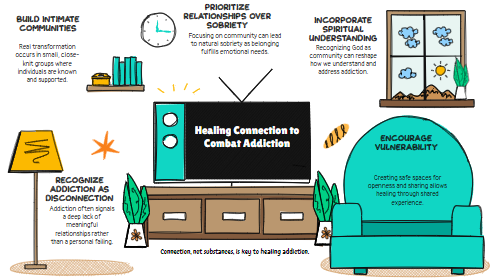
The Divine Design for Human Connection
The Divine Design for Human Connection
People need people. God made us that way.
This simple truth reveals something profound about addiction, community, and the very nature of God Himself. When we examine the epidemic of substance abuse sweeping through our society, we typically frame it as a problem of personal choice, willpower, or moral failure. But what if we've misdiagnosed the disease?
Addiction isn't primarily about substances. It's about substitutes.
Research increasingly shows that addiction functions as a symptom of disconnection rather than a moral failing. People don't typically become addicted because they lack character. They become addicted because they lack connection. The substance or behavior becomes a substitute for the genuine human bonds we were designed to experience.
This understanding transforms how we approach healing. If disconnection drives addiction, then authentic community becomes the antidote.
The Relational Void
Our modern world excels at connecting devices while disconnecting souls. We live in an age of unprecedented technological connection yet unprecedented personal isolation. The average American reports fewer close friends than previous generations, while rates of loneliness have reached epidemic proportions.
Into this relational void rush the false comforts of addiction. Alcohol numbs the pain of isolation. Drugs provide chemical substitutes for the neurochemical rewards of human bonding. Screens offer shallow connection without vulnerability. Food becomes comfort when communion is absent.
The addict isn't pursuing pleasure so much as escaping pain. And the deepest pain is the absence of being truly known, truly seen, truly loved.
This perspective shifts our response from judgment to compassion. The person struggling with addiction isn't primarily making bad choices. They're making desperate choices to address legitimate needs through illegitimate means.
Jesus and His Kingdom Cells
When we look at Jesus' ministry model, we discover something remarkable about His approach to human transformation. While He certainly taught the masses, His primary strategy involved forming a tight-knit, missional community.
Jesus didn't just preach to crowds. He created a family.
The twelve disciples weren't merely students absorbing information. They were apprentices sharing life. They ate together, traveled together, served together, and struggled together. Jesus modeled vulnerability by sharing His fears in Gethsemane. He demonstrated service by washing their feet. He called them friends, not servants.
This intimate community became the launching pad for global transformation. The early church continued this pattern, meeting in homes where people knew each other's names, needs, and stories. These "kingdom cells" provided the relational context where healing could occur and discipleship could flourish.
True transformation happens in circles, not rows.
The Trinity as Divine Community
Why does God design us for community? Because community reflects His very nature.
The doctrine of the Trinity reveals something astounding about reality. At the heart of existence isn't an isolated individual but a love-fueled community. Father, Son, and Spirit exist in perichoresis, a divine dance of mutual indwelling where each Person fully knows and is fully known by the others.
God isn't just a creator of community. God is community.
The Trinity demonstrates perfect unity without uniformity. The Father, Son, and Spirit maintain distinct identities while sharing complete union. They model intimate connection without codependency, showing us that healthy community preserves uniqueness while fostering belonging.
When Genesis declares humans are made in God's image, it reveals we are wired for this same type of communion. Our hunger for connection isn't weakness. It's design. Our need for others isn't a flaw in human nature but a reflection of divine nature.
Healing Through Reconnection
This trinitarian understanding transforms our approach to addiction and recovery. If disconnection drives addiction, then reconnection becomes the path to healing.
Effective recovery programs have long recognized this truth. Alcoholics Anonymous doesn't merely offer information about sobriety. It creates communities where people share stories, vulnerabilities, and support. The power lies not just in the twelve steps but in the circle of chairs where those steps are worked.
Churches function best when they move beyond information transfer to relational transformation. The ekklesia (church) Jesus envisioned wasn't primarily an institution but an intimate community where people could be fully known yet fully loved. Where masks could drop and healing could begin.
This model challenges our individualistic approaches to spiritual growth and recovery. We cannot heal in isolation. We need others to reflect God's love, speak truth, and walk alongside us. Just as the Persons of the Trinity find their identity in relationship, we discover our true selves in communion with God and others.
The Way Forward
What might this mean for our communities, churches, and recovery programs?
First, we must recognize addiction as a symptom pointing toward our deeper need for connection. This shifts our response from condemnation to compassion, from punishment to presence.
Second, we should structure our communities to facilitate genuine relationships rather than merely efficient programs. Small groups, shared meals, and authentic vulnerability create spaces where healing can occur.
Third, we must acknowledge that information alone rarely transforms. People change in the context of loving relationships that reflect the trinitarian pattern of knowing and being known.
Our hunger for connection isn't weakness. It's the echo of our design in the image of a God who exists as eternal community. And our healing path forward isn't found in greater willpower or better techniques, but in rediscovering the divine design for human connection.
In a world of increasing isolation, building authentic community isn't just nice. It's necessary. It's not just biblical. It's healing.
Because people need people. God made us that way.
